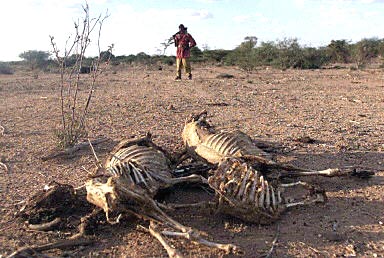Omar, 30, has buried four of her children, who died of hunger, and is now one of thousands of drought-displaced people migrating to urban centres in search of help in southern Somalia.
Omar's home is a makeshift shelter in a camp for internally displaced persons (IDPs), with more than 3,000 families (18,000 people) near Kurtunwarey district, 140km south of the capital, Mogadishu. A community leader in the camp told IRIN that trucks were picking up emaciated families by the roadsides and dropping them off at the nearest urban centres.
Omar survives on the good will of the local community. She spoke to IRIN on 4 July:
"We were very comfortable when we had our animals. We were one of the better-off families in Da'ara. But this changed when we lost our last cow five months ago. They died one by one. We could not even sell them.
"The cows were all we had. My husband went looking for food every day in the bush but there was not much to hunt. It was like the whole country was dying. Some days, he will come with enough from the bush to eat for one meal; other days we will go hungry. We went hungry more days than we ate. My children started dying slowly.
"I lost four of my six children to hunger. We felt helpless. There is nothing in the world worse than watching your own child die in front of your eyes because you cannot feed him.
"We finally left the village two weeks ago to try to save the last two. Now we are in this camp in Kurtunwarey with many other families like us. I am breastfeeding both of my children because I have nothing else. There is nothing left in my breasts but I have to give them something.
"Many children in this camp are so weak they can no longer control their bodily functions. The community here has been good but there too many of us and they are not much better off anyway.
"I keep wondering how long we will survive like this. I am worried about my last two children; I pray to God for help to come before it is too late for many of us.
"Every day we are burying someone here; you wake up in the morning and find that somebody’s child has passed away or you are woken up by the wail of a mother who just lost a child.
"I am losing hope; I don't know whether or not the situation will ever get better. Every day, I keep wondering whether we will eat today or not. I will do anything to keep my children alive but don’t know what to do. There is nothing here, no job, no food.
"Maybe this is our fate or maybe a miracle will happen and we will all be saved from this nightmare."
ah/mw
This article was produced by IRIN News while it was part of the United Nations Office for the Coordination of Humanitarian Affairs. Please send queries on copyright or liability to the UN. For more information: https://shop.un.org/rights-permissions





